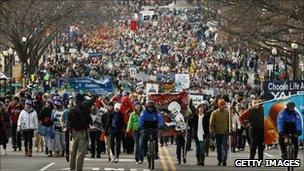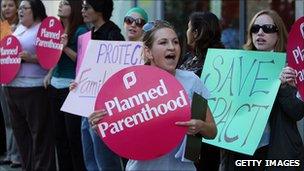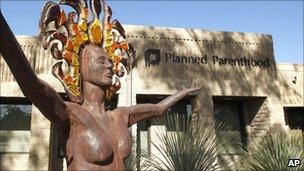US fight over abortion heats up again
- Published

Anti-abortion supporters recently staged their annual "march for life" in Washington DC
Abortion has long been a lightning rod in American politics. Now, amid hidden video camera stings, bitter argument over the definition of rape, late-night satire and reinvigorated Republicans, the debate is heating up again.
For many years, the abortion debate in the US has remained in a kind of stasis. No compromise seemed possible and each side knew aggressive pushes would provoke an equally fierce response.
Aside from elections - where abortion is invoked to motivate each party's base and presidential candidates must proffer their Republican anti-abortion or Democratic pro-choice credentials to sate primary voters - the issue has rarely gathered steam in recent sessions of Congress.
Until now.
After offering an anti-abortion amendment that almost derailed the entire healthcare reform process last year, anti-abortion members appear emboldened.
Led by Republicans Mike Pence and Chris Smith, two abortion-related measures are headed to the House of Representatives, where Republicans now have sufficient votes to pass them without any support from Democrats.
Mr Pence is aiming to stop, external Planned Parenthood, a reproductive care organisation, receiving federal funds.
Planned Parenthood offers services including contraception, gynaecological and breast exams, and family planning, but is a favoured target for the anti-abortion lobby because it is America's leading provider of abortions.
It serves about 3 million women each year in its more than 800 clinics, and provided 324,008 abortions in 2008. The organisation says abortions account for only about 3% of its budget.
Anti-abortion activists have long had Planned Parenthood in their sights, keeping an almost constant vigil of protesters outside their clinics.
Their campaign to deny it federal funds has been aided recently by the release of several hidden camera videos showing a man posing as a pimp asking Planned Parenthood workers about services for under-age prostitutes.
Secret videos
Live Action, the anti-abortion group behind the videos, contends that they demonstrate the willingness of Planned Parenthood "to aid and abet in the sexual exploitation of minors and young women".

Planned Parenthood uses federal money to offer family planning services but not abortions
In one video, external, a Planned Parenthood worker in New Jersey is seen saying that 14- or 15-year-old girls should not admit their age when trying to procure an abortion.
She tells the man posing as a pimp that Planned Parenthood has reporting requirements for girls under 15, so perhaps he should take them to a clinic where "their protocols are not as strict as ours".
The worker was later fired.
A local Planned Parenthood spokeswoman said she had violated policy "as well as our core values of protecting the welfare of minors and complying with the law".
In another video, a worker tells a supposedly under-age girl that the clinic could help her hide an abortion from her parents, in possible contravention of parental consent laws.
"This proves beyond a shadow of a doubt that Planned Parenthood intentionally breaks state and federal laws and covers up the abuse of the young girls it claims to serve," Live Action's president, Lila Rose, said.
Planned Parenthood said that it was aware of the "pimp" visits prior to the release of the videos and had found them concerning.
It contacted the FBI, who began investigating the alleged sex traffickers with the full co-operation of clinic employees.
A spokesperson responded to one video by saying that the staff member concerned had "reacted professionally to a highly unusual person posing as a patient". At least 12 clinics had reported visits by men claiming to be sex traffickers.
Planned Parenthood spokesman Stuart Schear condemned the undercover videos.
"Falsely claiming sex trafficking to health professionals to advance a political agenda is an astoundingly cynical form of political activity," he said.
Planned Parenthood also notes that it is legally barred from using federal money for abortions.
The organisation says it has a careful accounting process to ensure that taxpayers' dollars are only used for other services - largely family planning for low-income women.
Regardless, the videos have become another weapon in the conservative armoury being mobilised to target abortion.
Naral, a pro-choice organisation, is ready to take on the anti-abortion activists.
"They want to shrink government to be just small enough to fit inside our bedrooms and our medicine cabinets," Naral president Nancy Keenan told the BBC.
She aimed her criticism at the new Republican leader in the House of Representatives, John Boehner.
"Americans did not give John Boehner and his cronies a mandate to interfere in our personal, private decisions."
'Forcible' rape
The second measure, external working its way through Congress, sponsored by Mr Smith, is an attempt to bar the federal government from providing any funds for abortion.

Planned Parenthood clinics have long been the target of anti-abortion protesters
It stems from a 1976 provision known as the Hyde amendment.
Named after its sponsor, Representative Henry Hyde, the amendment prevents the health department from using taxpayer dollars to cover abortion for Medicaid recipients - which is one of the few ways federal government money could have been used to pay for abortions.
But the Hyde amendment is an annual provision, meaning that it must be renewed every year.
Proponents of Mr Smith's bill argue that it is simply codifying the intent of the Hyde amendment.
Pro-choice advocates see it differently: they say it goes much further.
Mr Smith's bill would stop the government from providing tax credits or subsidies to women who choose health insurance plans that cover abortion, even if the woman pays for abortion cover herself.
Similarly, employers whose health insurance plans include abortion would be denied tax credits.
Exceptions in the cases of rape, incest or where the life of the mother is in danger have traditionally been accepted by anti-abortion groups.
But until last week, the language in Mr Smith's bill was "forcible rape", meaning the rape of drugged, unconscious or handicapped women for example might not be covered.
After an outcry from women's groups and a particularly cutting satirical sketch on late-night host Jon Stewart's programme, the Daily Show, the word forcible was dropped.
Still, pro-choice groups see its original inclusion as evidence that conservatives are seeking to restrict women's reproductive choices as tightly as possible.
The abortion stalemate it seems, is over. The base is energised. Just in time for the 2012 elections.
- Published13 January 2011
- Published16 December 2010
- Published28 September 2010